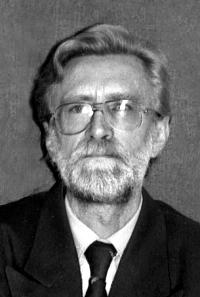 A
prominent expert on ethnic and racial issues was shot dead in his St. Petersburg
apartment over the weekend in an attack that his colleagues and human rights
advocates believe was carried out by extremists. A
prominent expert on ethnic and racial issues was shot dead in his St. Petersburg
apartment over the weekend in an attack that his colleagues and human rights
advocates believe was carried out by extremists.
Nikolai Girenko, 64, was killed when he went to answer the doorbell
in his apartment at about 9 a.m. Saturday, investigators said Monday.
The killer fired a rifle at him through the closed door.
Minutes before the attack, neighbors saw two suspicious-looking men
on the staircase of Girenko's apartment building, investigators said.
No suspects had been detained as of Monday.
Deputy St. Petersburg Prosecutor Andrei Zhukov said investigators believe
Girenko was killed because of his work as a researcher and expert witness
in a number of trials involving extremism. Girenko assisted the City Prosecutor's
Office in several high-profile court cases, including the 2002 murder
of Azeri watermelon vendor Mamed Mamedov and an ongoing investigation
of a local skinhead group known as Schultz-88.
Over the past two years, he carried out about two dozen studies of neo-Nazi
and skinhead groups for Moscow and St. Petersburg authorities. The work
has helped lead to several convictions.
But Zhukov said Girenko's killing might have been an act of hooliganism
-- the charge that prosecutors tend to file against suspects in extremist
attacks.
Girenko's colleagues and human rights advocates said they have no doubts
that extremists were behind the attack.
"I simply do no see any other possible reason," said Girenko's
boss, Yury Chistov, director of the St. Petersburg Museum of Ethnography
and Anthropology. Girenko had worked at the center since 1970.
"Nikolai Mikhailovich was a scientist who combined his academic
career with intensive public activities and dedicated considerable time
to ethnic expertise, sometimes putting his own academic career on the
back burner," Chistov said by telephone from St. Petersburg.
Chistov said that even though Girenko was an outspoken critic of neo-Nazi
groups and had repeatedly warned that extremist attacks were on the rise,
he did not usually get involved in criminal investigations and trials
at his own initiative. Often he participated only after receiving formal
requests for assistance from prosecutors, he said.
Chistov, who knew Girenko for 30 years, said Girenko never mentioned
receiving any threats. "He was a very quiet and modest person,"
he said.
Yury Vdovin, representative of the St. Petersburg office of the Citizens
Watch human rights group and a friend of Girenko's, said the only enemies
Girenko might have had were nationalistic-minded extremists.
"I have known the man for 15 years and, considering his professional
interests, I can't help but blame nationalists for his murder," Vdovin
said.
He said St. Petersburg authorities should also shoulder some of the
blame. "They were able to carry out this vendetta largely because
city authorities have long ignored the existence of skinheads and extremists
in the city by portraying their activities as hooliganism," he said.
A group of Moscow-based human rights activists appealed Monday to the
Prosecutor General's Office to take over the investigation of Girenko's
murder from city prosecutors.
"We insist that the Russian authorities finally acknowledge the
danger of the growth of neo-Nazism and xenophobia" and boost efforts
to combat it, the group said in a statement.
But Prosecutor General's Office spokeswoman Yelena Antonova said her
office had no plans to take over the case yet.
Alexander Vinnikov, a senior official at the St. Petersburg Union of
Scientists, of which Girenko was a member, said Girenko was the country's
leading expert on extremism in Russia.
Girenko is perhaps best known for developing a method of classifying
ethnically motivated crimes, which he published in a book. "He began
studying the issue back in 1986, when Nazi groups started to emerge openly,"
Vinnikov was quoted by Izvestia as saying. "Our police often tried
to present Nazi crimes as hooliganism or regular crimes, and absence of
a method of classification was their popular excuse for doing so. But
Girenko co-authored a book that provided an important instrument for investigating
such cases."
Olga Korshunova, Girenko's co-author on the book, said the book is now
used by prosecutors and investigators alike.
"Given the peculiarities of our criminal legislation, which makes
it extremely hard to investigate and explain the motive for a crime that
is probably racially motivated, Girenko's contribution to such cases and
their results were enormous," said Korshunova, who oversees the department
specializing in prosecutor investigations at the St. Petersburg Legal
Institute.
Vyacheslav Sukhachev, a sociologist at St. Petersburg State University
and a friend of Girenko's, told Izvestia that Girenko was deft at using
logic to made convincing arguments in the courtroom. "I remember
Nikolai Mikhailovich during trials. On the one side, aggressive, mad thugs.
On the other side, a very calm and objective person who mockingly ignored
frank boorishness and was always able to shut down a hysterical scandalmonger,"
he said.
In addition to worries about extremism, Girenko's murder raises another
issue: the safety of witnesses and other participants in criminal investigations
and trials. The State Duma has repeatedly rejected legislation providing
safety to witnesses over the past decade.
There are about 50,000 skinheads in Russia, with about 1,500 each living
in Moscow and St. Petersburg, according to the Moscow Bureau of Human
Rights.
It said 20 to 30 people per year have died in extremist attacks in recent
years, and the number of attacks is growing by 30 percent annually.
Staff Writer Galina Stolyarova contributed to this report from St.
Petersburg
See also:
the original at
www.themoscowtimes.com
Human Rights
|